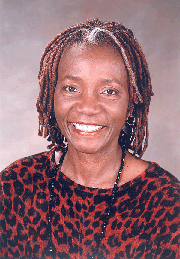 Akasha
Gloria Hull
Akasha
Gloria HullAuthor
FemmeNoir
A Web Portal For Lesbians Of Color
 Akasha
Gloria Hull
Akasha
Gloria HullPoet, writer, historian and critic Akasha Gloria Hull is the author of Soul Talk: The New Spirituality of African American Women. The book is an compelling blend of stories, practical advice about spirituality in daily life, and intimate conversations with some of American's most influential black writers, including Alice Walker, Lucille Clifton, Toni Cade Bambara, Sonia Sanchez, Michele Gibbs, Dolores Kendrick, Masani Alexis De Veaux, Namonyah Soipan and Geraldine McIntosh. Topics include healing, race, Christianity, New Age religion, African and neo-African spirituality, feminism, creativity, and communing with one's ancestors.
Akasha Gloria Hull is also the author of Healing Heart (1989), a volume of original poetry. Other works include Color, Sex and Poetry: Three Women of the Harlem Renaissance (1987), Give Us Each Day: The Diary of Alice Dunbar-Nelson (1986), and the ground-breaking curriculum guide, All the Women Are White, All the Blacks Are Men, But Some of Us Are Brave (1982), a vigorous assertion of the black female voice in response to its marginalization by the feminist and civil rights movements. The book received both the Outstanding Women of Color Award and the Women Educator's Curriculum Material Award.
Akasha Gloria Hull has received fellowships from the Rockefeller Foundation, the National Endowment for the Humanities, the Ford Foundation, the Mellon Foundation, and the American Association of University Women. Since 1988, she has served as Professor of Women's Studies and Literature at the University of California, Santa Cruz.
Akasha Gloria Hull is a writer, professor of
literature and women's studies, lecturer, and consultant. Her
previous books include Healing Heart: Poems, 1973-1988
(Kitchen Table, Women of Color Press, 1989); editor, The
Works of Alice Dunbar-Nelson (Oxford University Press,
1988); Color, Sex and Poetry: Three Women of the Harlem
Renaissance (Indiana University Press, 1987); editor,
Give Us Each Day: A Diary of Alice Dunbar-Nelson (W.W.
Norton, 1984); and co-editor, All the Women Are White, All
the Blacks Are Men, But Some of Us Are Brave: Black Women's
Studies (Feminist Press, 1982). She lives in northern
California.
"Along with Toni Morrison, Charlotte
Carter, and Lois Elaine Griffith, we are blessed with another
foreign tongue: the voice of a free, fearsome, sensual and vivid
woman of color. [Akasha] Gloria Hull is 'family.' She's one of
us. She means to live." -
Ntozake Shange on Healing Heart
"[The] truths that waft up from this powerful, practical and nourishing gumbo make interesting reading for anyone. In this intelligent work of the heart and spirit, Hull reveals the exquisite and reflective interiors of African-American women." - Publishers Weekly (starred review)
"Soul Talk is a worthy tribute to Toni Cade Bambara and to the lives and work of African American women writers." - Toni Morrison, author of Beloved and Paradise
Gloria Hull grew up in a three-room shotgun house in Shreveport, Louisiana. Neither of her parents finished grammar school. Her mother was a cook and a domestic. Her father was disabled, but did whatever kind of work he could pick up as a carpenter. She considered her upbringing to be working poor:
Hull graduated from Booker T. Washington High School in 1962 as the valedictorian of her class. She went to Southern University, and then won a National Defense Education Act fellowship to the University of Illinois at Urbana to study English literature:
Before Hull went to graduate school, she married her college sweetheart, who had graduated the year before her from Southern and had gone to pursue a Ph.D. in Chemistry at Purdue University in Lafayette, Indiana. He came from a family that was even more economically disadvantaged than hers: he had one pair of jeans that he had to wash out at night and dry in front of a space heater, iron, and put on the next morning. There were twelve children in his family. After spending one semester at Urbana, Hull gave up her fellowship and went to be with her husband at Purdue, where she became a teaching assistant. Her husband got a job at the University of Delaware when Hull was finishing her dissertation and looking for a job:
Source:
http://www.albany.edu/writers-inst/hull_gloria.html
http://www.uga.edu/~womanist/harris3.1.htm

Soul Talk: The New Spirituality of African American Women

But Some of Us Are Brave: Black Women's Studies
Healing Heart: Poems 1973-1988
Works of Alice Dunbar Nelson (Schomburg Library on Nineteenth-Century Black Women Writers)
Color, Sex and Poetry: Three Women Writers of the Harlem
Renaissance (Everywoman: Studies in History, Literature &
Culture)
Give Us Each Day: The Diary of Alice Dunbar-Nelson
Home